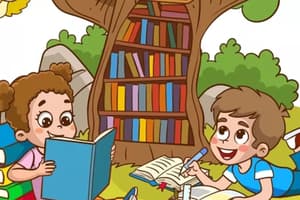Podcast
Questions and Answers
What is the primary goal of active reading?
What is the primary goal of active reading?
- To increase reading speed
- To engage with the text by asking questions, making connections, and summarizing (correct)
- To identify grammatical errors
- To memorize vocabulary words
Which of the following is a key concept in grammar?
Which of the following is a key concept in grammar?
- Vocabulary acquisition
- Literary device
- Reading comprehension strategy
- Clause and sentence structure (correct)
What does the denotation of a word refer to?
What does the denotation of a word refer to?
- The study of word origins and history
- The literal or dictionary meaning of a word (correct)
- The figurative meaning of a word
- The emotional or cultural association of a word
What is the primary goal of literary analysis?
What is the primary goal of literary analysis?
Which of the following is a strategy for improving reading comprehension?
Which of the following is a strategy for improving reading comprehension?
What is the primary function of syntax in language?
What is the primary function of syntax in language?
What is the term for the emotional or cultural association of a word?
What is the term for the emotional or cultural association of a word?
Which of the following is a key concept in literary analysis?
Which of the following is a key concept in literary analysis?
Flashcards are hidden until you start studying
Study Notes
Reading Comprehension
- Involves understanding and interpreting written text
- Requires reader to:
- Identify main ideas and supporting details
- Make inferences and draw conclusions
- Analyze and evaluate text structure and organization
- Identify author's purpose and tone
- Strategies for improving reading comprehension:
- Active reading: engaging with the text by asking questions, making connections, and summarizing
- Visualization: creating mental images to aid understanding
- Questioning: asking questions before, during, and after reading to clarify meaning
- Summarizing: condensing text into main ideas and supporting details
Grammar
- Refers to the rules and conventions of language, including:
- Syntax: the arrangement of words to form sentences
- Morphology: the study of word structure and formation
- Phonology: the study of sound patterns in language
- Key concepts in grammar:
- Parts of speech: nouns, verbs, adjectives, adverbs, pronouns, prepositions, and conjunctions
- Clause and sentence structure: independent and dependent clauses, simple, compound, and complex sentences
- Verb tenses: present, past, and future, and their various forms (e.g., progressive, perfect)
- Grammar skills:
- Identifying and correcting errors in sentence structure and word usage
- Using grammatical concepts to convey meaning and tone in writing
Vocabulary
- Refers to the words and phrases used in language, including:
- Denotation: the literal or dictionary meaning of a word
- Connotation: the emotional or cultural association of a word
- Etymology: the study of word origins and history
- Strategies for improving vocabulary:
- Contextual learning: learning words in context through reading and writing
- Direct instruction: explicit teaching of word meanings and usage
- Word families: learning related words and their prefixes, suffixes, and roots
- Vocabulary skills:
- Identifying and using precise words to convey meaning and tone
- Understanding and using figurative language, such as metaphors and similes
Literary Analysis
- Involves close reading and interpretation of literary texts, including:
- Fiction: novels, short stories, and poetry
- Nonfiction: essays, biographies, and memoirs
- Key concepts in literary analysis:
- Theme: the underlying message or idea of a text
- Character analysis: examining characters' motivations, traits, and relationships
- Symbolism: identifying and interpreting objects, colors, and other elements that carry meaning
- Tone and atmosphere: analyzing the emotional tone and setting of a text
- Literary analysis skills:
- Identifying and analyzing literary devices, such as imagery, foreshadowing, and irony
- Making connections between texts and historical or cultural contexts
- Developing and supporting a claim or argument about a text through evidence and analysis
Reading Comprehension
- Involves understanding and interpreting written text to identify main ideas and supporting details
- Requires reader to make inferences, draw conclusions, and analyze text structure and organization
- Identifying author's purpose and tone is also a crucial aspect of reading comprehension
- Active reading strategies include engaging with the text by asking questions, making connections, and summarizing
- Visualization and questioning are also effective strategies to improve reading comprehension
- Summarizing involves condensing text into main ideas and supporting details
Grammar
- Refers to the rules and conventions of language, including syntax, morphology, and phonology
- Syntax involves the arrangement of words to form sentences
- Morphology is the study of word structure and formation
- Phonology is the study of sound patterns in language
- Grammar involves identifying and correcting errors in sentence structure and word usage
- Using grammatical concepts to convey meaning and tone in writing is also essential
- Key concepts include parts of speech, clause and sentence structure, and verb tenses
Vocabulary
- Refers to the words and phrases used in language, including denotation, connotation, and etymology
- Contextual learning, direct instruction, and word families are strategies for improving vocabulary
- Identifying and using precise words to convey meaning and tone is a crucial vocabulary skill
- Understanding and using figurative language, such as metaphors and similes, is also important
- Vocabulary skills involve using context clues, synonyms, and antonyms to determine word meanings
Literary Analysis
- Involves close reading and interpretation of literary texts, including fiction and nonfiction
- Key concepts include theme, character analysis, symbolism, and tone and atmosphere
- Literary analysis skills involve identifying and analyzing literary devices, such as imagery, foreshadowing, and irony
- Making connections between texts and historical or cultural contexts is also essential
- Developing and supporting a claim or argument about a text through evidence and analysis is a crucial literary analysis skill
Studying That Suits You
Use AI to generate personalized quizzes and flashcards to suit your learning preferences.




